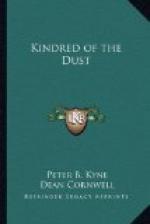She rose wearily and entered the little house. Old Caleb sat at the dining-room table playing solitaire. He looked up as she entered, swept the cards into a heap and extended his old arm to encircle her waist as she sat on the broad arm of his chair. She drew his gray head down on her breast.
“Dadkins,” she said presently, “Donald McKaye isn’t coming to dinner to-morrow after all.”
“Oh, that’s too bad, Nan! Has he written you? What’s happened?”
“No; he hasn’t written me, and nothing’s happened. I have decided to send him word not to come.”
[Illustration: SHE STOLE TO THE OLD SQUARE PIANO AND SANG FOR HIM.]
“Aren’t you feeling well, my dear?”
“It isn’t that, popsy-wops. He’s the new laird of Tyee now, and he must be careful of the company he keeps.”
Old Caleb growled in his throat.
“Much he cares what people think.”
“I know it. And much I care what people think, for I’ve grown accustomed to their thoughts. But I do care what his father thinks, for, of course, he has plans for Donald’s future, and if Donald, out of the kindness of his heart, should become a frequent visitor here, The Laird would hear of it sooner or later—sooner, perhaps, for it would never occur to Donald to conceal it—and then the poor laird would be worried. And we don’t owe The Laird that, father Brent!”
“No; we do not.” The old face was troubled.
“I met Mrs. Daney on the beach, and it was she who gave me the intimation that The Laird had heard some cruel gossip that was disturbing him.”
“I’m sorry. Well, use your own judgment, daughter.”
“I’m sure Donald will understand,” she assured him. “And he will not think the less of us for doing it.”
She got up and went to the peculiar and wholly impractical little desk which Mrs. McKaye had picked up in Italy and which Donald, calm in the knowledge that his mother would never use it or miss it, had given her to help furnish the house when first they had come to the Sawdust Pile. On a leaf torn from a tablet, she wrote:
THE SAWDUST PILE, Saturday Afternoon.
DEAR DONALD:




